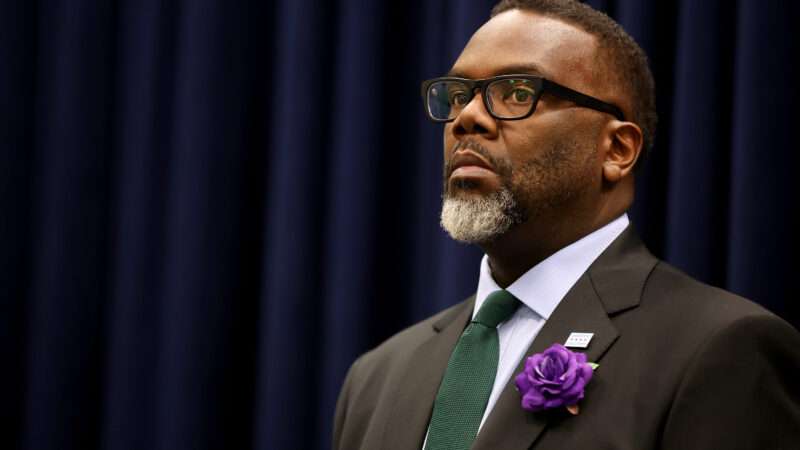
Chicagoans last month rejected a hefty real estate tax hike meant to fund assistance for the city's 68,000 homeless people, dealing a blow to Mayor Brandon Johnson's progressive economic agenda.
Fifty-two percent of voters said no to a March 19 referendum that sought to increase the transfer tax on properties over $1 million, claiming that such a move would "generate at least $100 million every single year, and be legally dedicated to programs that alleviate homelessness, including assistance for children, veterans, and those fleeing gender-based violence."
Those who opposed the hike consisted in part of the predictable political suspects. "I don't think people trust the Chicago government group, aldermen, mayor, or whatever, to use the money appropriately," said Aaron Del Mar, a GOP strategist and former Cook County Republican Party chair. But there were also some strange bedfellows. "We're going to ask folks to pay more taxes for another $100 million," said Brendan Reilly, a Democrat and alderman on Chicago's City Council, "yet I still can't get a straight answer on where the $200 million we allocated for this year has gone, where it's been spent, and if there's been a return on investment."
The mayor's agenda has "been aggressive against the business community here," Reilly said. Some of the loudest pushback came from real estate groups, which protested that the measure unfairly targeted businesses. After all, most properties sold over the price of $1 million are commercial properties. In February, a trade association had successfully shut down the initiative in a lower court on constitutional grounds before that ruling was overturned by an appeals court. "This referendum would be a backdoor property tax on all Chicagoans, and it is important that our elected officials not mislead voters otherwise," Farzin Parang, executive director for the Building Owners and Managers Association of Chicago, said in a statement after the first ruling.
Though the tax hike was marketed as one that would target wealthier residents, dissenters said that spin conveniently failed to account for the fact that many buildings worth over $1 million include apartment buildings and multifamily complexes, which would then pass the price of the tax hike down in the form of higher rent prices.
"The landlord is going to push [the tax] on us," Chicago renter Debbie Daniels said in an interview with The New York Times. That outcome would have been bitterly ironic for those in Chicago, who were told by the campaign behind the initiative, Bring Chicago Home, that the increase would fund affordable housing.
In response to the defeat, Bring Chicago Home alleged the movement was struggling because it "faced an onslaught of attacks from those responsible for creating the housing crisis." But that fails to account for why the effort attracted ire from across the political aisle. Chicago isn't exactly a conservative city. A majority of voters simply didn't see the transfer tax as the best solution to what is admittedly a concerning issue.
"Higher tax burdens would affect not just the owners of various commercial properties, but their customers, employees, and tenants as well," Katherine Loughead, a senior policy analyst wrote for the Tax Foundation. It is not at all unlikely that Johnson's proposed tax would have punished middle-class Chicagoans while exacerbating the very issue—homelessness and affordable housing—he claimed the tax hike would solve.
You don't have to look very far for an example of how this works in practice. In 2022, the city of Los Angeles passed a similar tax hike on properties worth more than $5 million. "Immediately the real estate, the high end real estate market went off a cliff," said Conan Nolan, NBC Los Angeles' chief political reporter. Proponents of that tax increase forecasted it would raise $900 million annually. One year later, however, the spending allocated in the budget from that tax topped out at $150 million. The debacle is particularly relevant in a state like California, which, from 2018 to 2023, spent about $20 billion to fix homelessness, only to add more to the homeless population than any other state.
Johnson should take note. His loss in Chicago demands he offer more logical, long-term solutions that don't hurt the people he wants to help.
The post Chicago Mayor's Solution to Homelessness Fails to Convince Voters appeared first on Reason.com.







